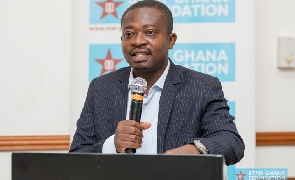 AGI President, Seth Twum-Akwaboah
AGI President, Seth Twum-Akwaboah
The Association of Ghana Industries (AGI), the umbrella body of manufacturing companies in the country, has endorsed Ghana adding nuclear power to its energy mix.
However, the Association, has called on the government to ensure a stable macroeconomic environment to enable industries participate fully, and benefit from the country’s nuclear power programme.
Ghana is expected to establish its first nuclear power plant by 2030 to contribute about five per cent to the country’s energy mix by that time and increase to 35 per cent by 2070.
Among others, nuclear power is to ensure energy security, help meet electricity generation demands, contribute to low carbon emission, and support Ghana’s industrialisation agenda, while creating jobs in the value chain.
To achieve this, Seth Twum-Akwaboah, the Chief Executive Officer (CEO), of the Association, said Ghana required a stable macroeconomy, which would make industry thrive.
He said this in an exclusive interview with the Ghana News Agency on Tuesday, June 4, on the margins of the opening day of a three-day workshop for some reporters and editors in Accra.
The workshop was on the theme: “Media support for Ghana’s Nuclear Power Project – the journey so far.”
Mr Twum-Akwaboah explained that with hydro continually dwindling and thermal being expensive and recurrent power fluctuations, it was important for
Ghana to have a secure, reliable, affordable, green and clean baseload, which nuclear energy could provide.
“Today, industries are struggling in several areas; for the nuclear power project, if we don’t have the capacity to acquire new technology and advance in ICT, and new machines, then, your capacity to even partner is weakened,” he said.
“Therefore, it’s very important for the environment to be conducive by stabilising the macroeconomy,” Mr Twum-Akwaboah, said, adding that it was important to make industries ready in terms of technology, funding, and capacity building.
“In all these, industries must be strong, and that would require that a conducive macroeconomic, so that when you invest, you get good returns, and be able to expand,” he said.
He said the government’s support in creating a conducive environment was crucial because industries had no control over external factors, including inflationary pressures, high cost of borrowing, and electricity.
“Those are the critical areas that the government must work on. There are some external factors, but whatever it is, efforts must be made to stabilise it in a way that encourages investment with a good return on it,” he encouraged.
Mr Franklin Addai, Head, Legal Department, Bui Power Authority (BPA), who is also the Secretary to the Nuclear Power Ghana (NPG), called for a good blend between exercising right to information, disclosure and transparency, among all stakeholders, especially, implementers of the nuclear power project and the media.
“The media should not be in the dark and leave room for speculation; the implementer must disclose fully, information that will not hurt the programme,” Mr Addai said.
Dr Stephen Yamoah, Executive Director, NPG, highlighted the gains made since media professionals were trained on nuclear power about three years ago.
He observed that there had been some improvement in media discourse on nuclear, including improved public education in demystifying misconceptions, and building public trust in nuclear.